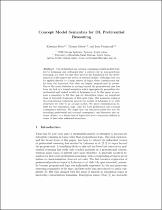JavaScript is disabled for your browser. Some features of this site may not work without it.
- ResearchSpace
- →
- Research Publications/Outputs
- →
- Conference Publications
- →
- View Item
| dc.contributor.author |
Britz, K

|
|
| dc.contributor.author |
Meyer, T

|
|
| dc.contributor.author |
Varzinczak, I

|
|
| dc.date.accessioned | 2011-09-21T11:08:11Z | |
| dc.date.available | 2011-09-21T11:08:11Z | |
| dc.date.issued | 2011-07 | |
| dc.identifier.citation | Britz, K, Meyer, T and Varzinczak, I. 2011. Concept model semantics for DL preferential reasoning. Proceedings of the 24th International Workshop on Description Logics (DL 2011), Barcelona, Spain, July 13-16, 2011 2011 | en_US |
| dc.identifier.uri | http://hdl.handle.net/10204/5147 | |
| dc.description | Proceedings of the 24th International Workshop on Description Logics (DL 2011), Barcelona, Spain, July 13-16, 2011 2011 | en_US |
| dc.description.abstract | The preferential and rational consequence relations first studied by Lehmann and colleagues play a central role in non-monotonic reasoning, not least because they provide the foundation for the determination of the important notion of rational closure. Although they can be applied directly to a large variety of logics, these constructions suffer from the limitation that they are largely propositional in nature. One of the main obstacles in moving beyond the propositional case has been the lack of a formal semantics which appropriately generalizes the preferential and ranked models of Lehmann et al. In this paper the authors propose a semantics to fill that gap for description logics, an important class of decidable fragments of first-order logic. Their semantics replace the propositional valuations used in the models of Lehmann et al. with structures they refer to as concept models. They prove representation results for the description logic ALC for both preferential and rational consequence relations. The authors argue that their semantics pave the way for extending preferential and rational consequence, and therefore also rational closure, to a whole class of logics that have a semantics defined in terms of first-order relational structures | en_US |
| dc.language.iso | en | en_US |
| dc.publisher | Conference paper | en_US |
| dc.relation.ispartofseries | Workflow request;7214 | |
| dc.subject | Model semantics | en_US |
| dc.subject | Description logistics | en_US |
| dc.subject | Semantics | en_US |
| dc.title | Concept model semantics for DL preferential reasoning | en_US |
| dc.type | Conference Presentation | en_US |
| dc.identifier.apacitation | Britz, K., Meyer, T., & Varzinczak, I. (2011). Concept model semantics for DL preferential reasoning. Conference paper. http://hdl.handle.net/10204/5147 | en_ZA |
| dc.identifier.chicagocitation | Britz, K, T Meyer, and I Varzinczak. "Concept model semantics for DL preferential reasoning." (2011): http://hdl.handle.net/10204/5147 | en_ZA |
| dc.identifier.vancouvercitation | Britz K, Meyer T, Varzinczak I, Concept model semantics for DL preferential reasoning; Conference paper; 2011. http://hdl.handle.net/10204/5147 . | en_ZA |
| dc.identifier.ris | TY - Conference Presentation AU - Britz, K AU - Meyer, T AU - Varzinczak, I AB - The preferential and rational consequence relations first studied by Lehmann and colleagues play a central role in non-monotonic reasoning, not least because they provide the foundation for the determination of the important notion of rational closure. Although they can be applied directly to a large variety of logics, these constructions suffer from the limitation that they are largely propositional in nature. One of the main obstacles in moving beyond the propositional case has been the lack of a formal semantics which appropriately generalizes the preferential and ranked models of Lehmann et al. In this paper the authors propose a semantics to fill that gap for description logics, an important class of decidable fragments of first-order logic. Their semantics replace the propositional valuations used in the models of Lehmann et al. with structures they refer to as concept models. They prove representation results for the description logic ALC for both preferential and rational consequence relations. The authors argue that their semantics pave the way for extending preferential and rational consequence, and therefore also rational closure, to a whole class of logics that have a semantics defined in terms of first-order relational structures DA - 2011-07 DB - ResearchSpace DP - CSIR KW - Model semantics KW - Description logistics KW - Semantics LK - https://researchspace.csir.co.za PY - 2011 T1 - Concept model semantics for DL preferential reasoning TI - Concept model semantics for DL preferential reasoning UR - http://hdl.handle.net/10204/5147 ER - | en_ZA |






